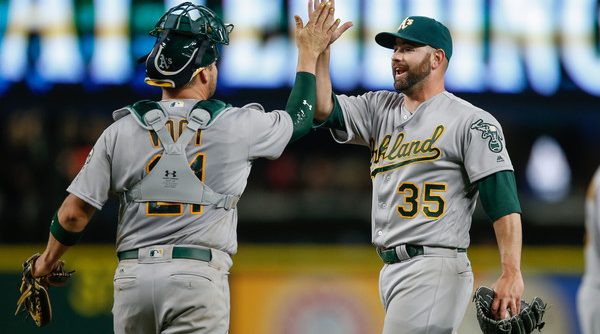In a move to bolster the bullpen and fry spell checks across the DC Metro area, the Nationals traded for the Athletics’ Marc “Scrabble” Rzepczynski. (Control-C, Control-V.) Rzepczynski gives Dusty Baker another left-handed reliever in the pen, something the team was hurting for with Sammy Solis on the DL and Oliver Perez battling nagging injuries and a bout of ineffectiveness. To acquire Rzepczynski, Mike Rizzo had to trade away prospect Max Schrock and send Reynaldo Lopez back to the minors to make room.
In Rzepczynski, the Nationals pick up a classic LOOGY (Left-handed One Out GuY). Marc (that’s so much easier) will throw a lot of sinkers at 92-93 MPH coupled with a biting slider and a changeup he uses solely against right handed hitters. In the past, he has been tough on lefties. In 2015, lefties had only a .291 wOBA against Rzepczynski compared to a .407 wOBA from righties. In 2014, he was even tougher on lefties, limiting them to a .207 wOBA with a similar .402 wOBA against the right handers. This season, though, those splits have flipped. Lefties are posting a .332 wOBA against him, while righties are putting up a paltry .293 wOBA. Don’t overact to a small sample size, though. Rzepczynski has seemingly pissed off the BABIP gods this season, as lefties have a .404 BABIP against him — likely the result of the league-worst defense he pitched in front of in Oakland.
Digging a little deeper, and the positive signs remain. Marc yet again has a solid strike out rate, though his walk rate is a little elevated this season. But six of the 24 walks he has issued this year, or 25 percent, were intentional. For the rest of his career, intentional walks compose less than 10 percent of his total walks. And despite the small sample size results above, Rzepczynski has a 26 percent strikeout rate versus lefties compared to only a 18 percent rate against righties, proving he’s still tough on the left handed hitters. While his groundball rate is not quite nice at 69.5 percent, it’s elite — meaning Nats infielders better be ready for action when Rzepczynski takes the bump.
If playoff experience is your thing, Rzepczynski also fits the bill. He’s played on three separate playoff teams and won a World Series ring with the Cardinals. He’s pitched 10 2/3 playoff innings, so if Rzepczynski’s time comes in October, he’s at least been there before.
Rzepczynski didn’t come free, though. In giving up Schrock, Rizzo didn’t trade away one of the Nationals’ top prospects, but he’s an interesting minor leaguer nonetheless. A 5-foot-8 second baseman, the 21-year-old Schrock has posted consistently above average offensive numbers in his brief time in the Nationals system since being drafted in the 13th round in 2015. He makes a lot of contact, with a little pop, and rarely strikes out. His defense has been a question mark, even at the less demanding second base position. While the size and offensive profile have shades of Jose Altuve, Schrock ultimately profiles as a utility infielder. In that sense, Schrock wasn’t much to give up for Rzepczynski plus cash.
On the other hand, the structure of this deal continues a Lerner style, mid-season trend for the Nats. In order to be traded in August, Rzepczynski had to pass through waivers. That meant every team had a chance to claim Marc, pay a small fee to the A’s, and pick up Rzepczynski (and his contract) for the rest of the year, assuming Oakland wanted to give him up for free. Instead, Rzepczynski passed through without being claimed, allowing the Nats to make this deal.
The forgotten piece of this deal ends up being the cash considerations. Had the Nationals picked up Rzepczynski’s full salary for the rest of the season, Schrock wouldn’t have been the guy to go. He’s got too much value for a straight up trade. But when the Lerners or Rizzo demanded the cash come with Rzepczynski, the price of doing business went up. Rzepczynski can and likely will be valuable come playoff time, but he didn’t have to be as expensive as the Nationals made him if the team had been willing to pay his salary.
Schrock likely will never turn into a superstar. Rzepczynski fills an area of need for the Nationals, especially if Solis can’t return to 100 percent this season. He’s not a relief ace and his contract is up at the end of the year, but Rzepczynski has the ability to get left handers out. While the process that arrived at the trade isn’t ideal, if Rzepczynski gets key left handed batters out in big games, it’s worth the price.
Tags: Marc Rzepczynski, Max Schrock, Nationals, Nats, Washington Nationals





Leave a Reply